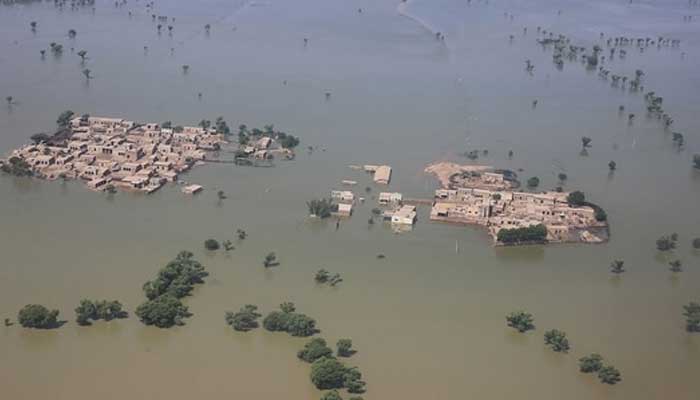This year, Pakistan has faced the most monstrous climate catastrophe in the country’s history, leaving a third of land mass here under water.
The sheer staggering numbers of people affected by the monsoons and the ensuing floods are increasing by the day, the majority of them women and children. However, climate change is more than just changing temperatures and weather patterns. The estimated number of people affected is comparable to the entire population of Manchester.
The monsoons and floods which have affected coastal regions in Sindh have destroyed precious farmland, homes, livestock, and taken more than 1300 lives, a third of which are children. The problem now is the water left behind by the flood which is proving difficult to remove. It has become a reservoir for mosquitoes and water-borne diseases, further adding to the suffering of those still stuck there.
Since the water has stagnated in cotton and crop farms, that means a looming toll on the major industrial backbone of Pakistan’s economy which is already under pressure from growing inflation.
Foreign Minister Bilawal Bhutto Zardari has estimated that about 80-90 per cent of main crops, such as rice, wheat, sugarcane, and vegetables, have been washed away by the flood, showing how grim the situation truly is. His efforts have been crucial to getting global attention, especially from the IMF and China. During his speech at the Ministerial Meeting in New York earlier this year, the foreign minister had said: “Hunger has no nationality, poverty does not care for the colour of our skin, viruses, bacteria and infections do not recognize borders, rising sea levels, and the threat of climate catastrophe does not recognize ethnicities”.
In his speech, Foreign Minister Bilawal Bhutto Zardari also held our history of colonialism and international political warfare accountable, a part of history that has left humanitarian crises in its wake. Bilawal Bhutto Zardari’s endeavours to bring solutions and change as part of climate diplomacy have been a ray of hope for all those people and areas affected.
The IMF has released $1.1 billion in aid, although it is estimated that we might need $20 billion dollars to help the catastrophe affectees return to their normal lives. China has been a quick responder to our situation as well, sending multiple necessary items as emergency humanitarian relief.
Despite the timely help, aid has been slow to reach the affected areas due to multiple factors. First, a lot of the disaster-hit areas are not accessible via land, and many people are stuck without food, aid, and clean drinking water. Second, there is mass migration of people trying to leave the areas subject to extreme weather conditions, floods, and wildfires. Third, the glaciers which provide water for crops and drinking, are melting and receding. The vast extent of global warming and its effects are uncountable.
Houses can be rebuilt, crops can be salvaged, but precious lives cannot be brought back. It is our duty to understand the extent of the devastating effects of climate change, and work to halt the progression if not entirely reverse it. The three main goals in the Paris Agreement include reduction of greenhouse gas emissions, mobilizing funds for those affected by extreme global warming catastrophes, and adapting to climate impacts.
In Pakistan, the city of Jacobabad in the Sindh province experienced temperatures of 51 degrees Celsius in the spring, and is one of the most devastated cities after the floods. Pakistan is responsible for approximately less than one per cent of global greenhouse emissions, so why is it bearing the brunt of the catastrophe? Many demand reparations in the form of monetary aid as well as cancelling debts as part of climate compensation.
The cost of climate catastrophe recovery is calculated to be at around $20 billion. Western countries have a big role in bringing the world’s climate to this stage and they must pay back reparations for all the damage they have caused. They must be held responsible. The poor are not the ones who caused climate change. Our people are not responsible for climate change the way the US, UK, Russia or China are. What may seem a distant effect of global warming to them will fast become a stark reality if we don’t work to stop burning fossil fuels and ignoring the cries of the affected.
The writer is a member of the Sindh Assembly


 Latest News2 days ago
Latest News2 days ago
 Business2 days ago
Business2 days ago
 Latest News2 days ago
Latest News2 days ago
 Latest News2 days ago
Latest News2 days ago
 Business2 days ago
Business2 days ago
 Latest News2 days ago
Latest News2 days ago
 Latest News22 hours ago
Latest News22 hours ago
 Entertainment2 days ago
Entertainment2 days ago











